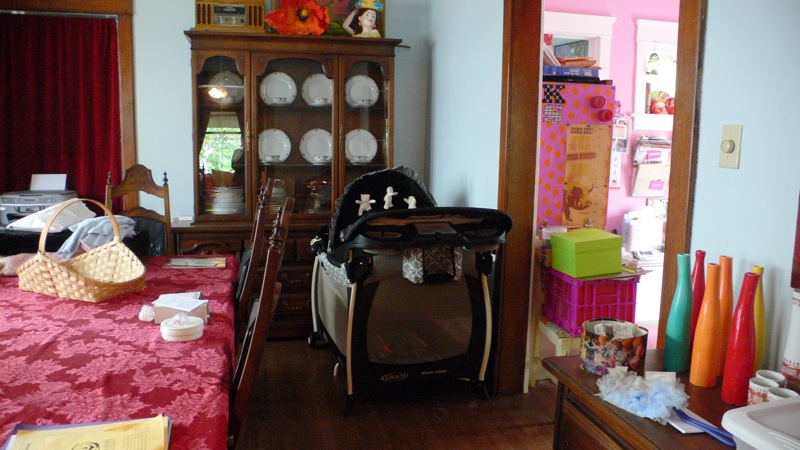Christian Fiction
by Amanda Markel
Reading is a great use of time…except when it isn’t.
I have enjoyed reading for as long as I can remember, and I’ve tried to pass that on to my children. There are many books from my childhood which hold a special place in my heart; treasure that I’ve looked forward to sharing with my children. There are also books from my pre-teen years, that looking back, make me cringe to think that I read them.
Lest you think I was reading something worldly and inappropriate when I was still in junior high school, let me reassure you—I wasn’t. I was reading something much more insidious—Christian fiction.
Christian fiction looks great on the surface. The material is clean—no foul language or smut to worry about. As a matter of fact, it can be very easy to grow complacent and assume that just because something is sold in a Christian bookstore, or has the imprint of a Christian publisher, that it’s great material for us, or for our children, to read and enjoy.
There is more than one problem with that logic, however, and it’s not just the fact that Christian fiction has become so mass-produced that much of it is badly written. To start with, while the content of Christian novels may be “clean,” they still run into the same problems that their more worldly counterparts have—namely, portraying relationships, particularly romantic relationships between men and women, in a most unrealistic fashion. Even without the sexual content found in secular novels, the romance in many Christian books, whether geared toward young women or adults, can eventually lead to unrealistic expectations, and dissatisfaction with the real world.
Isn’t that the point of fiction, you may ask? To escape from the real world, to a place where things are beautiful and perfect? Yes…to a point. But much in the same way that pornography has been proven to effect men in a negative way when they carry it into real-world relationships, women, too, carry the baggage of what they’re reading into their reality. If women of any age are reading material, Christian or otherwise, that makes them believe romantic relationships and marriage are something they’re not, it’s not worth the time it takes to crack open the book.
The other problem with Christian fiction might sneak up on you without you even realizing it—bad theology. I still remember reading a popular tween series when I was in junior high. A big focus of the books was the need for main characters to “ask Jesus into their hearts.” Despite the fact that I was in Confirmation class at the time, and that I had gone to a Lutheran day school from kindergarten on, I had no idea that there was a problem with this kind of language. As a matter of fact, as an young, impressionable pre-teen, I really wondered why the important people in my life, the ones who had encouraged me in my faith, had never told me that I was supposed to do that. So, I copied the prayer found in the book, and then announced to my mother that I had made that decision. And I couldn’t understand why she wasn’t more excited about it! These wonderful books that she had purchased for me at our local Christian bookstore were causing more harm than good in my life, and I couldn’t even fully grasp why until several years later! This is not unique to that one series, either…most Christian fiction I’ve read has referenced decision theology, believer’s Baptism, and even the dreaded “god” that was Martin Luther. This is not something confessional Lutherans should be wasting their time on!
Scripture tells us that while all things are permissible, not all things are beneficial. This applies even to things that look good on the outside, like Christian books. We are free to read whatever we want, but what benefit is such material to us as Christians, especially when it causes us to have unrealistic expectations, and corrupts our theology? In general, unless you’re reading these books with the intent to pick them apart and find their errors, I think there is really no true benefit.
There are some Christian authors that I do still read, but always with a discerning eye. In general, however, I’d rather read secular works, especially the classics, because I’m not expecting to learn any kind of theology from them, and I don’t need to go over every word with a fine tooth comb to make sure that Scripture isn’t being twisted. It is my hope that eventually, there will be more sound, theologically accurate Christian fiction available for Lutherans like me, but until then, I will filter everything I read through a very wary eye.
Photo credit: “d-221 books” by az licensed under CC BY-NC-SA 2.0




20 Comments
Kelly
The same could be said of contemporary Christian music, too.
Heather
Yes, this is true (and true of contemporary Christian music as well as Kelly pointed out). When I started going back to church, I read a lot of Christian fiction, most of it bad. And even though I liked some of the Amish novels, I could never understand the fascination that evangelical Christian fiction has with the Amish. But I’ve also noticed in my local library that A LOT of new fiction is just as terrible–not only with premarital sex and non-Christian values like that, but also with agendas, such as pushing attitudes towards assisted suicide. So between the bad Christian fiction, and the bad general fiction, what’s good to read?
Diane
@Heather #2
CPH has a new fiction writer, Katie Schuermann and her first book of fiction is titled, ‘House of Living Stones’. It’s pretty good. However, you can tell immediately that she isn’t a P.D James or Jane Austen.
Heather, you ask, ‘what’s good to read?’ I’ve gone back to some of the classics like ‘Gone With the Wind’ by Margaret Mitchell or the great Australian novel by Colleen McCullough, ‘The Thorn Birds’. In both of these novels, the characters are very complex, the settings are interesting and expansive and the relationships between the characters are compelling. Also, your local library might have a whole section labeled, ‘Mysteries’. They are usually well written and intriguing.
Diane
LadyM
May I recommend going to some Lutheran reading lists and perusing them to find good materials to read? Higher Things and The Consortium for Classical and Lutheran Education (ccle.org) are a couple that come to mind.
MrsReeder
I know exactly what you mean! I read a lot of Christian fiction as a teenager, and will still pick one up now and again. But some of my favorite stories hold the worst theology! That’s why I was so excited when Katie Schuermann wrote her novel. Sure it’s not what one would define as literary, but it’s a good, fun read that doesn’t make me twinge every time theology comes up. Noel Hynd is another author I like. While not Lutheran, the theology is a lot less a part of the story and more of just an aspect of the main character’s personality. Still, thanks for writing this post and pointing out the dangers of so-called Christian fiction.
Jan Payne
I like C.S. Lewis and J.R.R. Tolkien, too. My fiction reading tends to be alternate history and some fantasy. Even in books that don’t mention Christ, the themes of good and evil, sin and redemption are woven through much of it. I don’t really read many books with family drama themes – I have quite enough in real life :)
I did buy Katie Schuermann’s House of Living Stones for my mom and she liked it (but she enjoys the Amish novels too – sshh)
Faith
I stay away from Christian fiction and Contemporary Christian music for the same reasons. It’s harder to pick apart theologically bits of pop culture that work their way into your brain when they come with that label. “But! It’s Christian! It’s good for you!” It’s so hard to explain to my littles that, no, a song all about me and what I do for God to love me today is wrong.
I suggest the “Thy Strong Word” series by Alan Kornacki. He’s a solid LCMS pastor with a passion for writing (and disclaimer: my husband). CPH did not (and still does not) take fiction submissions (I assume they went with KS because of her strong non-fiction following), and not wanting to shop around a story about a Lutheran pastor and his relationships, he self-published through Amazon and CreateSpace.
There ARE some solid theology fiction authors out there, but the organization who should be spearheading their distribution, well, won’t. My husband was just one who decided to not wait around. I’m sure here are others who just dint want to deal with the self-pub hassle. Keep your eyes open, support them, and tell CPH that you want to support them. Maybe eventually they’ll listen.
Jane
There is so much good fiction out there! It just takes a little digging. (And an almost total avoidance of Christian fiction.) The classics and other older novels are a good place to start, but there is some excellent current fiction, too.) I have found that a combination of Goodreads and friends’ recommendations have been a wonderful way to always have a full to-read pile.
Faith
I hit enter too soon. I meant to say that there ARE some solid theology fiction authors out there, but the organization who should be spearheading their distribution, well, won’t. My husband was just one who decided to not wait around. I’m sure here are others who just dint want to deal with the self-pub hassle. Keep your eyes open, support them, and tell CPH that you want to support them. Maybe eventually they’ll listen.
Betty
I enjoy the books by Jan Karon. Well written, clean, no Baptist/evangelical theology. Father Tim is an Episcopal priest so the theology in the books is more traditional than most so called Christian fiction.
Alan Kornacki
If you don’t mind a brother butting in for a minute…
I’ve begged CPH to publish Lutheran fiction since at least 2003, since the first time I read Maier’s “The Flames of Rome.” Most of the stuff out there is metho-funda-bapti-costal. I finally decided that, if I wanted to read Lutheran fiction, I’d have to write it myself. I’m encouraged to see CPH finally cracking their door, and I hope they open it further. In the meantime, Katie’s book is a good start. Ray Keating has four Lutheran thriller books out in his “Warrior Monk” series, which is well written and mostly very Lutheran (except when the pastor preaches, since his sermons sound like political speeches).
For general Christian Fiction, I love Jan Karon’s Mitford/Father Tim books. The theology is usually pretty good (except when Father Tim converts people by having them pray the prayer in which the person accepts Jesus as his personal savior, or when Father Tim is overjoyed to welcome the new female pastor into town, and a few other things), and she does a great job of showing the pastor and the community.
K.M.
I’m loving that people are giving some Lutheran fiction recommendations! I also appreciate the work this site is doing.
As far as my own reading goes, I’m in grad school studying literature, and I consume a lot of 20th-century and contemporary work. If nothing else, the portrayal of the human condition is often more honest and stark than in so-called Christian literature.
The other Kelly
Don’t let’s forget Lars Walker! Action-packed Viking novels with good theology.
I’ve been delving into the golden age of detection fiction lately. A surprising number of this clan are Christians, such as Dorothy Sayers and G.K. Chesterton. The Father Brown stories I’ve long loved, and even where the theology is a bit off, it’s not ruinous like much pop-Christian fiction. Agatha Christie’s most famous creation, detective Hercule Poirot, is a devout Catholic. The writing in a lot of these classic stories is usually not overly preachy, but you get to see how the faith of the characters and/or authors interacts with the serious topics of life and death, crime and confession, mercy and justice. Interesting stuff.
K.M.
Another good suggestion, other Kelly. :)
Also, since no one has mentioned him, of course the Swedish Bo Giertz is another great Lutheran author. His *Hammer of God* was a huge influence on me. I had been resisting learning about Lutheranism prior to the book (feeling that I had already gone through one theological struggle and thought that I had found my “final” camp), and reading that book broke down some of my opposition.
For people who like Austen and the Brontës (aside: I would wholeheartedly endorse the less well-known books by Charlotte Brontë: *Shirley* and *Villette*), another good author from the 18th century is Elizabeth Gaskell. Also, Victor Hugo’s novels, plays and poetry (often has Christian themes).
General 20th century / contemporary literature: Orhan Pamuk, Georges Perec (*W* and *Life, a User’s Manual*), Flannery O’Connor. These are not for everyone’s taste, but they are great writers.
K.M.
Correction to above: I meant *19th century* for Elizabeth Gaskell… :)
Emily Olson
Another fiction recommendation: Kristen Lavransdatter by Sigrid Undset. A Pulitzer Prize winner, this series of novels chronicling a woman’s life in medieval Norway will change you. It’s incredibly insightful about human nature, the spiritual and very physical consequences of sin and guilt, the trajectory of romantic love from first infatuation to early marriage to learning to live with the realities of a sinful spouse….I could go on. I heard about it years ago and finally read it–and wonder what took so long!
Sadie Quinn
I haven’t really read much Christian fiction, although I’ve wanted to. A friend recommended that I check out “Holy Fool, Holy Father” by Nicholas A. Marziani Jr., //www.holyfoolholyfatherthenovel.com/. The reviews look really good; you should check it out too! I’m going to look in to some of these other titles that people have suggested here!
Grendelssohn
Amanda,
Thank you for this excellent appraisal of “Christian fiction”! A couple years ago, I was appointed “librarian” for our church library, and immediately began the weeding process. After spending a year or more trying to suck the poison out book-by-book, I finally got permission to essentially sweep the shelves. This included all of the “fiction”. Interestingly, it was over the “fiction” that I received my only push-back, and have been wanting–needing–to publish a response in our church newsletter as to why I got rid of and do not intend to replenish the “Christian” fiction on our shelves. I confess I have yet to apply myself to this task. However, as your above post is such a well written, concise response–as well as being “female” (Let’s be honest, it is women who read “Christian fiction,” not men, and it has been from women that I have received the push-back.)–I am hoping you will consent to my publishing it in our next month’s church newsletter.
Outside of formatting, I will of course do nothing to the text itself, and will include all identifying info; name, date, blog title and link… and whatever else you may require. Please reply to let me know I you will be willing to allow me to share your post with my church.
soli Doe gloria,
Grendelssohn
Amanda
Please feel free to use it in any way it might be helpful to you!
Grendelssohn
Vielen Dank!
soli Deo gloria,
Grendelssohn